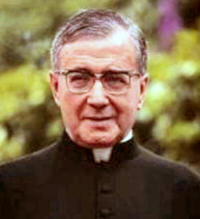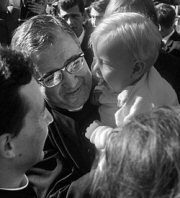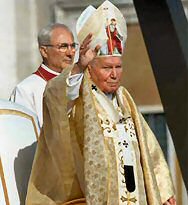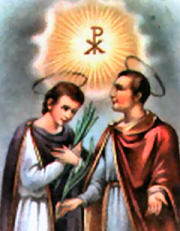Collect: God our Father, you chose St. Josemaría to proclaim the universal call to sanctity and apostolate in the Church. By his example and prayers, grant that in faithfully carrying out our daily work in the Spirit of Christ, we may be formed in the likeness of your Son, and together with the most Blessed Virgin Mary, serve the work of redemption with an ardent love. We ask this through our Lord Jesus Christ your Son, who lives and reigns with you and the Holy Spirit, one God, for ever and ever. Amen. St. Josemaría Escrivá was born in 1902 at Barbastro Spain. He was ordained in Saragossa in 1925 and by divine inspiration founded Opus Dei which opened a new way for the faithful to sanctify themselves in the midst of the world. He died on June 26, 1975 and was canonized a saint on October 6, 2002. According to the 1962 Missal of Bl. John XXIII the Extraordinary Form of the Roman Rite, today is the feast of Sts. John and Paul, martyrs, two brothers, who encouraged each other to remain faithful in their sufferings. They are named in the Roman Canon of the Mass (Eucharistic Prayer I).
St. Josemaría Escrivá de Balaguer In 1915, José Escrivá's business failed and he found other work, which required the family to move to Logrono. It was as a teenager in Logrono that Josemaria for the first time sensed his vocation. Moved by the sight of footprints left in the snow by a barefoot friar, he sensed that God was asking something of him, though he did not know exactly what it was. He thought becoming a priest would help him discover and fulfill this calling from God, so he began to prepare for the priesthood, first in Logrono and later in Saragossa. Josemaría's father died in 1924, leaving him as head of the family. After his ordination in 1925, he began his ministry in a rural parish, and subsequently continued it in Saragossa. In 1927, Fr. Josemaría's bishop gave him permission to move to Madrid to obtain his doctorate in law. In 1946 Fr. Josemaría took up residence in Rome. During his years in Rome, he obtained a doctorate in Theology from the Lateran University and was appointed by Pope Pius XII as a consultor to two Vatican Congregations, as an honorary member of the Pontifical Academy of Theology, and as an honorary prelate. He traveled frequently from Rome to various European countries, and to Mexico on one occasion, to spark the growth of Opus Dei in those places. In 1974 and 1975, he made two long trips to a number of countries in Latin America, where he met with large groups of people and spoke to them about their Christian vocation to holiness. Msgr. Escriva died in Rome on June 26, 1975. By the time of his death, Opus Dei had begun in dozens of countries and had touched countless lives. After his death thousands of people, including more than a third of the world's bishops, sent letters to Rome asking the Pope to open his cause of beatification and canonization. Ten years later, on October 6, 2002, John Paul II canonized the founder of Opus Dei in St. Peter's Square before a multitude of people from more than 80 countries. In his discourse to those who attended the canonization, the Holy Father said that "St. Josemaría was chosen by the Lord to proclaim the universal call to holiness and to indicate that everyday life, its customary activities, are a path towards holiness. It could be said that he was the saint of the ordinary." Information Office of Opus Dei on the Internet Things to Do: Sts. John and Paul Both John and Paul were highly venerated by the Roman Church. They are mentioned in the Canon of the Mass and in the Litany of the Saints. Their particular virtue was love toward the poor. The following, at least, is historically certain: these two court officials were martyred and buried in their own house. Byzas and Pammachius transformed this house into a church dedicated to the two martyrs. Excavations have proven these points. Beneath the church were found their home, the tombs, and the place of execution. Excerpted from The Church's Year of Grace, Pius Parsch Symbols: Thunderbolt; sword.
Daily Readings for: June 26, 2010
(Readings on USCCB website)
RECIPES
ACTIVITIES
PRAYERS
 26th
26th Saturday of the Twelth Week of Ordinary Time; Optional Memorial of St. Josemaría Escrivá de Balaguer, priest (in some dioceses) Old Calendar: Saints John and Paul, martyrs
St. Josemaría Escrivá was born in Barbastro, Spain, on January 9, 1902. He had five siblings: Carmen (1899-1957) and Santiago (1919-1994) and three younger sisters who died when they were small children. His parents, José and Dolores, gave their children a deep Christian education.  On October 2, 1928, during a spiritual retreat, Fr. Josemaría saw what it was that God was asking of him: to found Opus Dei, a way of sanctification in daily work and in the fulfillment of the Christian's ordinary duties. From then on he worked on carrying out this task, meanwhile continuing his priestly ministry, particularly to the poor and the sick. During these early years of Opus Dei, he was also studying at the University of Madrid and teaching classes in order to support his family. When the Civil War broke out in Madrid, religious persecution forced Fr. Josemaría to exercise his priestly ministry clandestinely and to move from place to place seeking refuge. Eventually, he was able to leave the Spanish capital; and, after a harrowing escape across the Pyrenees, he took up residence in Burgos. When the war concluded in 1939, he returned to Madrid and finally obtained his doctorate in law. In the years that followed he gave many retreats to laity, priests, and religious, and continued working assiduously to develop Opus Dei.
On October 2, 1928, during a spiritual retreat, Fr. Josemaría saw what it was that God was asking of him: to found Opus Dei, a way of sanctification in daily work and in the fulfillment of the Christian's ordinary duties. From then on he worked on carrying out this task, meanwhile continuing his priestly ministry, particularly to the poor and the sick. During these early years of Opus Dei, he was also studying at the University of Madrid and teaching classes in order to support his family. When the Civil War broke out in Madrid, religious persecution forced Fr. Josemaría to exercise his priestly ministry clandestinely and to move from place to place seeking refuge. Eventually, he was able to leave the Spanish capital; and, after a harrowing escape across the Pyrenees, he took up residence in Burgos. When the war concluded in 1939, he returned to Madrid and finally obtained his doctorate in law. In the years that followed he gave many retreats to laity, priests, and religious, and continued working assiduously to develop Opus Dei.  Pope John Paul II beatified Msgr. Escriva on May 17, 1992, in St. Peter's Square in Rome. The ceremony was attended by approximately 300,000 people. "With supernatural intuition," said the Pope in his homily, "Blessed Josemaría untiringly preached the universal call to holiness and apostolate."
Pope John Paul II beatified Msgr. Escriva on May 17, 1992, in St. Peter's Square in Rome. The ceremony was attended by approximately 300,000 people. "With supernatural intuition," said the Pope in his homily, "Blessed Josemaría untiringly preached the universal call to holiness and apostolate."
 The Acts of these two martyrs, which historians regard as spurious, contain the following: "The two brothers, John and Paul, were valets to Constantia, the daughter of Emperor Constantine. For their excellent work she bequeathed to them a considerable sum. This they used to aid poor Christians. When Julian the Apostate (361-363) invited them to become members of the inner circle of the imperial household, they refused and boldly explained that they did not relish close association with one who had fallen away from Jesus Christ. The Emperor gave them ten days to reconsider their position, threatening them with death if at the end of this time they refused to do his bidding and sacrifice to Jupiter. The brothers used the interval to distribute what remained of their possessions to the poor so that they could begin their journey home to God with less hindrance, while at the same time benefiting many who would 'receive them into the everlasting dwellings' (Luke 16:9). Their choice was death, and they were beheaded in their own house."
The Acts of these two martyrs, which historians regard as spurious, contain the following: "The two brothers, John and Paul, were valets to Constantia, the daughter of Emperor Constantine. For their excellent work she bequeathed to them a considerable sum. This they used to aid poor Christians. When Julian the Apostate (361-363) invited them to become members of the inner circle of the imperial household, they refused and boldly explained that they did not relish close association with one who had fallen away from Jesus Christ. The Emperor gave them ten days to reconsider their position, threatening them with death if at the end of this time they refused to do his bidding and sacrifice to Jupiter. The brothers used the interval to distribute what remained of their possessions to the poor so that they could begin their journey home to God with less hindrance, while at the same time benefiting many who would 'receive them into the everlasting dwellings' (Luke 16:9). Their choice was death, and they were beheaded in their own house."